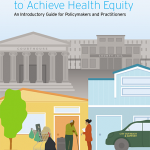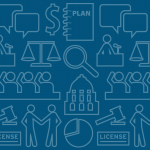Across the United States, inadequate access to safe, stable, and affordable housing is reaching a crisis point, acutely affecting people with disabilities. A new article published in The Milbank Quarterly, Stopping the Vicious Cycle: Equitable Enforcement Strategies to Achieve Safe, Stable, and Accessible Housing for People with Disabilities, explores how two dimensions of inequitable enforcement — underenforcement of some laws and overenforcement of others — interact and amplify one another in the context of housing policies, creating a vicious cycle of poverty, poor health, and marginalization for people with disabilities.
The article explores how two dimensions of inequitable enforcement — underenforcement of some laws and overenforcement of others — interact and amplify one another in the context of housing policies, creating a vicious cycle of poverty, poor health, and marginalization for people with disabilities.
Using the frameworks of disability justice and health justice, authors Katie Hannon Michel, Maya Hazarika Watts, and Jessica Breslin (all from ChangeLab Solutions) and Elizabeth Tobin-Tyler (Brown University School of Public Health) propose solutions that policymakers can use to facilitate equitable enforcement, ensuring compliance with the law while considering and minimizing harm to marginalized people.
Laws designed to facilitate the provision of safe and accessible housing, such as housing safety codes and civil rights laws prohibiting various forms of housing discrimination, are chronically underenforced, yet even as people with disabilities are frequently excluded from the benefits of these laws, they are also disproportionately subject to punitive laws related to housing. The authors explain that the negative impacts of both underenforcement and overenforcement are a systemic problem that requires systemic solutions.
According to the article, rectifying the US housing crisis will require significant investment in affordable housing, including focused investments in accessible housing for people with disabilities. It will also require policy changes that address the ways in which current laws, as well as their implementation and enforcement, prioritize landlords and developers over people who are experiencing intersectional structural disadvantages based on, for example, race, disability, or income.
“In the long term, stable housing that properly accommodates people with disabilities will improve health, increase employment, decrease the need for emergency services, and reduce incarceration, promoting health justice for people with disabilities and their communities.”
The article concludes, “In the long term, stable housing that properly accommodates people with disabilities will improve health, increase employment, decrease the need for emergency services, and reduce incarceration, promoting health justice for people with disabilities and their communities.”
If you wish to incorporate equitable enforcement into your policy landscape, check out our guide Equitable Enforcement to Achieve Health Equity, which discusses best practices in design and development of enforcement provisions to promote community health.
Additionally, in 2021, the authors discussed how an equitable enforcement framework applies to pandemic response in an article published in the American Journal of Public Health — Equitable Enforcement of Pandemic-Related Public Health Laws. This year's article explores the same concepts in the context of housing and disability justice.
1/14/2024; revised 1/29/2024


